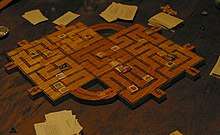Wiz-War
Wiz-War is a 4-player board game created by Tom Jolly and first published in 1985 through Jolly’s company, Jolly Games. It is described as a "beer and pretzels game".[1]
| Designer(s) | Tom Jolly |
|---|---|
| Publisher(s) | Jolly Games, Fantasy Flight Games (2012) |
| Publication date | 1985 |
| Players | 2-5 |
| Playing time | 15-60 minutes |
The board in Wiz-War is made up of individual segments that form a labyrinth that the players must navigate. The layout of is different each time the game is played and can also be modified by players during gameplay. Wiz-War uses cards to represent (among other things) spells cast by players.
Publication history
Tom Jolly designed and hand-assembled the first edition of Wiz-War, selling the game through his company Jolly Games. The first edition has low production value, consisting of photocopied typewritten rules, simply designed two-by-three-inch cards, hand-silkscreened cardboard boards, and photocopied chits, all contained in a clear plastic Ziploc bag.[2] The second, third, and fourth editions feature higher production values and a box.
Starting in 1993, the fifth edition of Wiz-War was published by Chessex under license from Tom Jolly.[2] After the release of the seventh edition in 1997, Wiz-War went out of print. In 2002, Tom Jolly and Chessex announced an eighth edition would be released,[3] but in 2009, Jolly announced that he had canceled the contract with Chessex and had reached agreement to republish the game with Fantasy Flight Games.
Fantasy Flight Games released the eighth edition in 2012 with modified rules for faster play.[4]
Gameplay

Wiz-War is a turn-based board game for 2–4 players that takes place in a dungeon. Each player is a wizard, represented on the board by a cardboard wizard token, and starts the game on a particular segment of the board. The center of this segment is the player's home base. Each player has two treasures, also represented by tokens, located in that player's segment.
The object of the game is to steal two treasures from opponents while retaining two. If a player successfully steals a treasure but in the meantime loses a treasure to another player, then the player is no further ahead and must start again to try to steal two more treasures. A player who loses both of their treasures is out of the game.[5]
A player wins by either placing two treasures belonging to other players on home base in addition to retaining 4 total treasures, or by eliminating all other players.[5]
Cards are dealt to each player to represent spells that may be cast, objects (both magical and mundane) that may be used, and other actions that may be taken by that player. These cards are generally discarded when used and can be replenished throughout the game. Each player begins the game with fifteen life points that can be lost in a variety of ways. A player who loses all life points is out of the game.[5]
The relative simplicity of the game is deceiving; turns can be structured in a highly complex and sophisticated way to take maximum advantage of the cards in a player's hand and avoid interference by other players.[5]
Reception
In April 1990, Ken Rolston of Dragon magazine called the first edition "a cheap-and-cheerful" game with "fairly primitive components". He liked the "fast, interesting play with lots of action and entertainment", and concluded that "It's an ideal game for killing an idle hour."[6]
In January 1993, Lester Smith of Dragon magazine liked the fifth edition of the game published by Chessex in 1993. His only criticism was of the cards, which he thought were of poor quality and therefore unlikely to stand up to repeated play, saying "the game strikes me as just a bit pricey, considering its components. ... if you like fast-paced, cutthroat, back-stabbing, fang-snapping ... games (at least on occasion), and if you can find other such people to play as well, then the Wiz-War game comes highly recommended."[5]
In December 1993, Allen Varney of Dragon magazine reviewed the Chessex's fifth edition, saying, "It's a kick, it's a hoot, it's a blast! ... Creative, savvy, elegant in its way, and utterly fearless in inventing bizarre effects, the game achieves a goofy charm."[2]
Wiz-War was chosen for inclusion in the 2007 book Hobby Games: The 100 Best. John Wick called Wiz-War "an exercise in cutthroat strategy" and "a damn funny game that will make you cry."[7]
References
- D. Dugan & Company, Inc. "Wiz-War - A beer and pretzels cult classic!". Retrieved November 28, 2015.
- Varney, Allen (December 1993). "Social Board Games". Dragon. No. 200. TSR, Inc. p. 120.
- "Chessex.com". Archived from the original on August 6, 2002. Retrieved November 28, 2015.
- "Jolly Game's Wiz-War". Retrieved November 28, 2015.
- Smith, Lester (January 1993). "Role-playing Reviews". Dragon. TSR, Inc. (189): 70–71.
- Rolston, Ken (April 1990). "Role-playing reviews". Dragon. TSR, Inc. (168): 38.
- Wick, John (2007). "Wiz-War". In Lowder, James (ed.). Hobby Games: The 100 Best. Green Ronin Publishing. pp. 369–371. ISBN 978-1-932442-96-0.
Further reading
- "White Wolf: Inphobia". White Wolf: Inphobia. No. 50. December 1994.